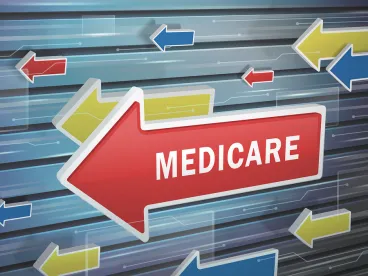Summary Takeaways:
-
Payment misalignment in Medicare FFS for Substance Use Disorder (SUD) treatment as the subject of potential legislative and/or regulatory reforms
-
New opportunities for investor-backed behavioral health platforms in Medicare Advantage and other value-based arrangements
-
New possible focus areas for health plans with expertise in Medicaid managed care to expand into Medicare managed care models for SUD treatment
The opioid epidemic has been further fueled by the COVID-19 pandemic and a recently published report by the Legal Action Center (entitled Medicare Coverage of Substance Use Disorder Care: A Landscape Review of Benefit Coverage, Service Gaps, and a Path to Reform) (the Report) shines a light on the shortcomings of Medicare to provide critically needed access and coverage for SUD treatment. According to its mission statement, the non-profit Legal Action Center uses legal and policy strategies to fight discrimination, build health equity, and restore opportunity for people with criminal records, substance use disorders, and HIV or AIDS.
While sadly most of us know someone impacted by opioid addiction, there is little public attention on this significant health issue for older adults. The fact is that chronic pain, a highly prevalent affliction for the aging and disabled population, has been accompanied by a significant increase in opioid use. Meanwhile, data shows that only approximately 23% of opioid-addicted Medicare beneficiaries receive any SUD treatment. The Report reveals that this treatment gap is likely attributable to the fact that Medicare’s coverage for SUD treatments is far less (in terms of scope, services, reimbursement rates, and otherwise) than that provided by employer health plans, other commercial payers, and even Medicaid.
The Report examines the current state of Medicare coverage for SUD treatments and advocates for reforms to deliver services recommended under evidence-based standards of care. Though Medicare Part A (institutional care), Part B (non-institutional medical items and services), and Part D (prescription drugs) cover certain components of SUD treatments on the care continuum, reimbursable services are generally grouped at the two extreme ends of the spectrum (i.e., the most intensive levels of care and least restrictive levels of intervention/screening) with little support in between. Specifically, Medicare Part A covers inpatient hospital treatment and certain extended care services; Medicare Part B covers physician services and certain outpatient services, as well as early intervention and screening services; and Medicare Part D covers prescription drugs which include medications for the treatment of SUDs (methadone, buprenorphine, and naltrexone, but generally only if provided in a physician office or other covered treatment setting). Medicare does not reimburse most intermediate levels of care – those typically furnished in the community by freestanding SUD treatment facilities.
Moreover, Medicare rules limit coverage for SUDs such that treatments are not covered to the same extent as for other medical conditions. For example, inpatient psychiatric hospital services are subject to a 190-day lifetime limit, whereas other inpatient medical services are generally reimbursable for a course of treatment for a spell of illness (generally defined as the period of consecutive days beginning with the first day on which a beneficiary is furnished inpatient hospital or extended care services are provided, and ending at the end of the first period of 60 consecutive days in which the beneficiary is in neither a hospital nor a skilled nursing facility). Further, many provider types widely accepted as effective in managing SUDs, including licensed counselors, certified addiction counselors, and peer counselors, are not authorized Medicare providers. This leads to a shortage of available Medicare providers, which drives up health-care costs for seniors, the Report said.
The limitations and restrictions on SUD treatment coverage under Medicare, if proposed or maintained by Medicaid or commercial insurers, would likely be invalidated by the federal 2008 Mental Health Parity Act (the Parity Law), a non-discrimination law which requires coverage of SUD and mental health benefits to be comparable to medical and surgical benefits. However, Medicare is the single largest payer exempt from the Parity Law.
Concluding that “patients who do not meet medical necessity criteria for acute hospital care, but are too ill to receive appropriate care in an office-based setting cannot access appropriate SUD services through Medicare,” the Report offers steps that Congress and CMS could take to improve SUD treatment for Medicare beneficiaries. These include extending coverage to intermediate SUD treatment settings; covering all practitioners authorized by state law to provide SUD treatments; and altering reimbursement standards. Though the Report makes clear that meaningful Medicare coverage reforms can be achieved short of amending the Parity Law, the Report advocates that extension of the Parity Law to Medicare would ensure comprehensive coverage for evidence-based SUD treatments and continuity and access to needed treatment for older and disabled Americans.
The question remains whether Congress and CMS will adopt any of the Report’s recommendations. Though the new Congress and presidential administration have many pressing policy matters on the agenda, it is perhaps revealing that President Biden campaigned on various priorities for tackling the opioid crisis and called on Congress last month to set aside $4 billion for HHS to expand drug treatment access during the pandemic. We will continue to monitor legislative and regulatory developments in the area of Medicare coverage of SUD treatments and implications for providers and investors.




 />i
/>i

